Books

Find a variety of genres to choose from: political memoirs, diaries, an autobiography told in comic-book fashion, historical fiction that will transport you back in time, page-turning political novels, essays and speeches from women activists that will encourage and inspire you. You'll meet a girl blogger writing from war-torn Baghdad, and you'll see why Marie Antoinette's outrageous wardrobe was actually part of a strategic political power play. You'll meet women who work for peace and espouse nonviolence in a violent world; and you'll peek into the lives of women living in a domestic harem.
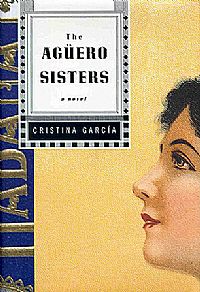
The Aguero Sisters
By Christina Garcia
1997/1998. USA/Cuba. Novel. Spanish/English.
This novel opens with a bang - literally. Blanca Aguero is with her naturalist husband, Ignacio, in Cuba's Zapata Swamp, and she turns just in time to see him shoot her. The novel is part mystery and part family history, told in alternating chapters by two sisters of this ill-fated couple who haven't spoken in thirty years. Both are raised in Cuba, yet they lead very different lives. Constancia Aguero emigrates to the United States, where she becomes a successful cosmetics entrepreneur. Her sister, Reina, a master electrician stays in Cuba and is an avid supporter of the revolution. As each sister reveals her feelings about their estrangement, their mother's death, and their lives, they come to understand the links between personal, familial and national identity.
Garcia's lush and mesmerizing descriptions of Cuba and what it is like to grow up in the midst of political upheaval make for a mesmerizing and unforgettable read.
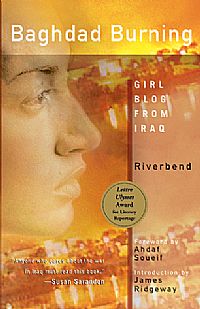
Baghdad Burning: Girl Blog from Iraq
By Riverbend
2005.Iraq. Political Blog. English.
The year is 2003, four months after Saddam Hussein's statue was toppled in Baghdad. Riverbend, a 24-year-old Iraqi woman and Baghdad native, begins to blog pseudonymously about her life. Baghdad Burning is the first year of her compelling eyewitness account of the changes that affect Iraqi women daily. Written with humor, irony, at exasperations at times, Riverbend chronicles life during the Iraqi War - from the inconveniences of intermittent water and electricity to the more serious impediments of her inability to find work, as she's restricted to her home. Find out why this wry and engaging computer programmer had internet fans on the edges of their seats as they waited to read what happened next.
Fortunately, there is a sequel, Baghdad Burning II, which continues this wry, engaging blogger's tale through 2005.
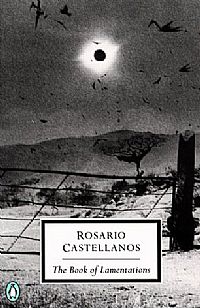
The Book of Lamentations
By Rosario Castellanos
1962/1998. Mexico. Novel. Spanish/English.
You've heard that history repeats itself, but in this novel, first published in 1962, Rosario Castellanos seems to prophecy the current political unrest in Chiapas, Mexico. In her epic tale, set in the 1930s, Castellanos imaginatively blends real political uprisings of the 1700 and 1800s to tell a story of race, class and gender conflict. The novel is told in the omniscient third person and features complex, memorable characters who clash with one another --rich landowners, politicians, corrupt religious officials, exploited Indians, and powerful women. One of the central characters is Catalina Diaz Piulia, a Mayan prophetess who chronicles the devastation she sees all around her.
The last fifty pages of this widely-acclaimed novel will keep you spellbound, though the subject matter is, as the title says, one of lamentations.
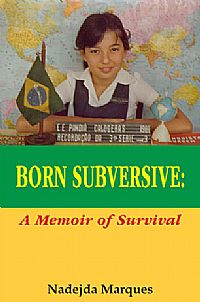
Born Subversive: A Memoir of Survival
By Nadejda Margues
2008. USA/Brazil. Political Memoir. English
Born Subversive follows Nadejda Margues through three decades of a life threaded with social and political upheaval in Latin America. Margues' father was tortured and murdered by the military regime that seized power in Brazil when Nadejda was just nine months old. Her mother then escaped to Chile, and Nadejda, who was taken separately by a friend, met her there - three days before General Augusto Pinochet's military coup. Mother and child now have to flee again and crisscross the globe from Sweden to Cuba and back to Brazil.
The latter part of the memoir tells of Nadejda's marriage to a human rights activist, her work in Angola, and eventual journey to Massachusetts where she teaches her daughter how identity, history, and politics are intertwined.
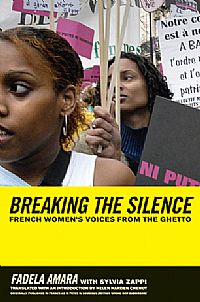
Breaking the Silence: French Women's Voices from the Ghetto
By Fadela Amara with Sylvia Zappi
2003/2006. Political Autobiography. French/English.
Fadela Amara's book is a personal and passionate account of the author's work to found a movement -- "Ni putes ni soumises" -- neither whores nor doormats, that would end gender inequities faced by Muslim women in France. The book is eloquently and thoughtfully written, and takes readers into a world beyond the stereotypes of Muslim women. For example, Amara analyzes young women's wearing of the veil, or Islamic headscarf in French schools, asking provocative questions about repressive policies imposed by fundamentalist men. She also poses provocative questions about problems of national identity and integration of French Muslims, and skillfully interconnects issues of France's colonial past with present marginalization of immigrants.
Breaking the Silence, a frank, first-person political treatment of Muslim women in France, created quite a sensation when it was published and won many awards.
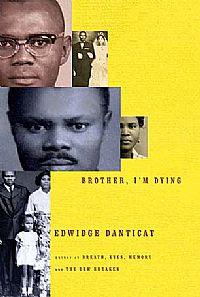
Brother, I’m Dying
By Edwidge Danticat
2007. USA/Haiti. Political Memoir. English
Like much of Danticat's fiction, this memoir explores life under the Duvalier regime, the experiences of Haitian immigrants to the United States, and the ways in which familial and political life intersect. This clear-eyed memoir details Danticat's own life as a woman and Haitian immigrant; the author learns she's pregnant and her father is dying on the same day. Told in a woman's voice, the memoir focuses on two men - Dandicat's father, Andre, who is dying of cancer, and his brother, Joseph, who stayed in Haiti and was like a surrogate father to the author. For Andre immigrated to the US to build a life for his family and left Danticat in Haiti under Joseph's care, when she was two years old.
The book is both a eulogy and a condemnation of US immigration policies post 9/11. For at 81, when Joseph tries to enter the US seeking political asylum, he is detained and shackled by customs agents. He dies alone and unexpectedly while his loved ones await his release.
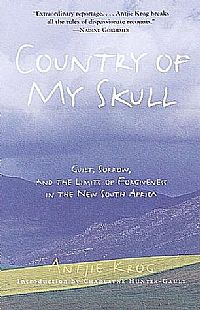
Country of My Skull: Guilt, Sorrow, and the Limits of Forgiveness in the New South Africa
By Antjie Krog
1999/2004. South Africa. Political Nonfiction. English/French
This emotional book by South African poet and journalist Antjie Krog follows two years of the reparations trials of South Africa's Truth and Reconciliation Commission, begun in 1999, to investigate human rights violations under apartheid. The book is part transcriptions of wrenching testimony by victims, part reportage, and part personal meditation, and Krog writes honestly and graphically about the abuse, violence, and torture that flourished under apartheid. She also writes about the severe emotional and psychological toll that daily chronicling of such abuses took on her own health and those who both witnessed and bore witness to such trauma.
Country of My Skull is a brave book that shows the truth behind apartheid, and it gives voice to those who suffered its atrocities.
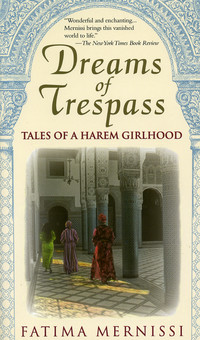
Dreams of Trespass: Tales of a Harem Girlhood
By Fatima Mernissi
1994/1996/1996/1998 Morocco. Autobiography. English/French/Spanish/Arabic
What do you think of when you hear the word "harem?" Fatima Mernissi takes readers not into the mythical harems of fiction but into a real life "domestic harem" in Fez, Morocco where the author lived with her extended family -- and where the women were secluded from society. But Mernissi's harem is not as oppressive as one might imagine, for the author skillfully blends fantasy and memory to tell of the hopes and dreams of the female members of her family. The author also contrasts the liberties her grandmother enjoys as part of country harem with the more restrictive rules governing women in an urban arrangement.
Mernissi's autobiography, with an interesting cast of characters and rich descriptions, is a magical read that will leave you feeling as if you've been transported to 1940s Morocco.
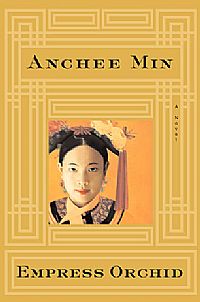
Empress Orchid
By Anchee Min
2004/2004/2006. USA/China, Historical Fiction. English/Spanish/French
In this historical novel, Min breathes life into Tsu Hsi, or "Empress Orchid," China's longest-reigning female ruler, who began as a concubine from a poor province and became the Emperor's fourth wife and mother of the "last Emperor." Min portrays Empress Orchid in a much more sympathetic light than she has been seen in history books or in the press, where she was known as the Dragon Lady. The novel, told in the first person by Empress Orchid, reveals a much more complex and intelligent woman, who uses her power and sexuality to retain her position in a male-dominated society.
Min did prodigious research for her novel, even smuggling documents out of the Forbidden City, and her tale is full of rich description that make 19th-century life in the Forbidden City come alive. Fortunately, Min wrote a sequel, The Last Empress, which covers the second half of Empress Orchid's life, as she matures from a young widower into a wise leader whose dynasty is under siege.
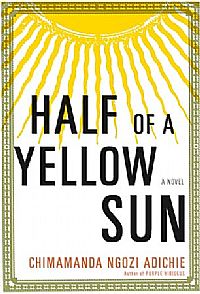
Half of a Yellow Sun
By Chimamanda Ngozi Adichie
2006/2007. USA/Nigeria. Political Novel. English/Spanish
Set in Nigeria in the 1960s, the context of this haunting novel is a largely forgotten war - the Nigerian Civil War to form an independent Biafran state. At the center of the novel are two twin sisters: Olanna and Kainene, both Igbo upper class women, whose love and loyalty is tested during the war. Adichie portrays the brutality and horrors of the three years' civil war in vivid and heartbreaking detail -- a mother fleeing from a massacre carrying her daughter's severed head, the butchering of the twins' relatives. The story is told mostly from the sister's points of view and that of Ugwu, a thirteen-year-old houseboy who is conscripted into the Biafran army.
Half of a Yellow Sun is a beautifully told novel about a tumultuous period in Nigerian history that has received little attention in other countries.
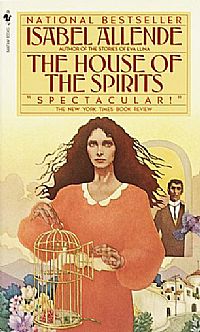
The House of the Spirits
By Isabel Allende
1982/1985. USA/Chile. Novel. Spanish/English/French.
In her debut novel, Allende tells the story of four generations of the Trueba family, blending familial history Chilean political history - from post-colonial social and political upheavals to the coup of 1973. The story is told mostly from the point of view of two protagonists: Esteban, the conservative patriarch who endeavors to build his empire, his hacienda, Las Tres Marias, and Alba, his granddaughter, who becomes a revolutionary in opposition to her grandfather. There are other memorable characters, including Esteban's wife, Clara, who is clairvoyant, and Blanca, Alba's mother. The novel is told in Allende's signature magical realist style, and though publishers initially rejected it, it became an instant international bestseller.
Allende's novel is a mesmerizing, epic tale that is hard to put down.
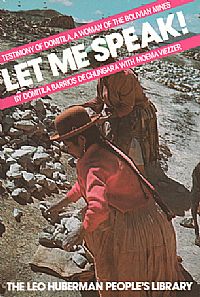
If You Would Let Me Talk, A Woman of the Bolivian Mines
By Domitila Barrios de Chungara
1977. Bolivia. Testimonial. Spanish/English
In this very moving, personal account, Domitila Barrios de Chungara recounts her life in the tin mines in the town of Siglo XX. Her tale vividly describes women's oppression, both at the hands of the mine owners and under the patriarchal system in Bolivia. Though she grew up in poverty, and continued to experience extreme hunger and deprivation, Barrios de Chungara fought tirelessly to improve the lives of women in her country. Her testimonial is filled with powerful episodes in which she confronts more educated government officials with heartfelt descriptions of women's "reality" living under oppression.
Though she was harassed, imprisoned, and tortured for her political activism, Domitila Barrios de Chungara refused to be silent. Her testimonial continues to speak eloquently of her struggle to end exploitation.
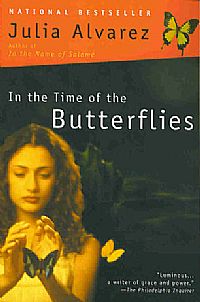
In the Time of the Butterflies
By Julia Alvarez
1994/1997/2001. USA/Dominican Republic. Historical Fiction. English/French/Spanish.
Inspired by a true story, this captivating novel tells the story of the Mirabal sisters -Patria, Minerva, Maria Terese and Dede - three of whom were murdered for their plot to overthrow the oppressive Trujillo dictatorship in the Dominican Republic. In this book, each sister takes turns in distinct styles and voices to describe their lives, from religious girlhoods in the 1940s to their dedication to overcoming the forces of oppression. The sole surviving sister, Dede, frames the book with her recollections and memories of her siblings. "Las mariposas," or the butterflies, refers to the code name of three sisters, who endured imprisonment, torture, and finally assassination in their dedication to the cause of freedom.
Alvarez brilliantly captures the terror and fear of living in a police state where people "disappeared" without a trace and shows the bravery of the remarkable Mirabal sisters.
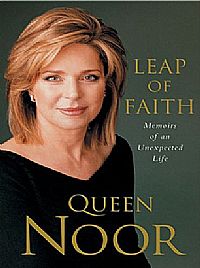
Leap of Faith: Memoirs of an Unexpected Life
By Queen Noor
2003. USA/Jordan. Political Memoir. English/Spanish
In a fairy-tale like story, American Lisa Halaby marries King Hussein and becomes Queen of Jordan. Leap of Faith briefly describes this romance. But the memoir's real story is much more political: Queen Noor writes that there is, "a fundamental lack of understanding in the West, especially in the United States, of Middle Eastern culture and the Muslim faith." Her memoir is an eye opening, behind-the-scenes look that aims to correct some of these misperceptions. The Queen focuses on her husband's attempts to broker peace in the Middle East and her work to improve the medical, educational, and cultural opportunities for the people of Jordan.
This well-told and clearly written memoir is really about the Queen's love for her adopted country.
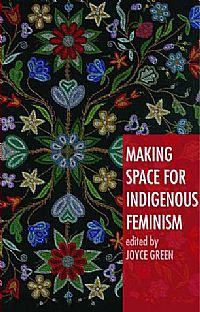
Making Space for Indigenous Feminism
By Joyce Green
2007. Transnational. Nonfiction/Criticism. English.
This important collection spans the gamut from theoretical essays to personal accounts of Aboriginal feminists to show that feminism is not irrelevant to indigenous women. On the contrary, the writings demonstrate how crucial feminism is in the struggles against oppression. The volume includes authors from Canada, the US, Sami (Samiland), and Aoteraoa/New Zealand and focuses on theories and practices of indigenous feminism. Essays include "What is Indigenous Feminism?" to "An Aboriginal Feminist on Violence Against Women." The writers focus on the universal commitments of women feminists - to ensure equality and end oppression.
Making Space is the first book of its kind to amass writings on indigenous feminism and fills a much-needed void.
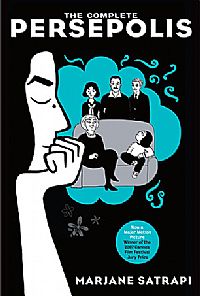
Persepolis: The Story of a Childhood
By Marjane Satrapi
2004. USA/Iran. Graphic Novel/Autobiography. English/French/Spanish
Marjane Satrapi was nine years old when the Shah was overthrown in Iran and a new fundamentalist Islamic Revolution was ushered in. Her autobiography, told in simple yet powerful comic book format, chronicles Satrapi's childhood and early adolescence during this tumultuous, political time. Through her childhood eyes, we see the horrors of war and totalitarianism: a favorite uncle imprisoned and executed, playmates killed, neighbors' houses bombed during the Iran-Iraq War. Interspersed with more universal experiences of adolescence, such listening to punk music or experimenting with cigarettes, are the unique changes of life in Tehran under a fundamentalist regime. In expressive black and white images, Satrapi shows the day girls are required to wear veils at school.
This fascinating autobiography ends when Satrapi is 14 and sent to Europe as her parents fear for her safety.
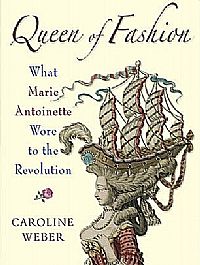
Queen of Fashion: What Marie Antoinette Wore to the Revolution
By Caroline Weber
2006. USA/France. Biography. English.
In this highly entertaining biography, French Professor Caroline Weber, shows how clothes really do make the woman. We first meet a defiant 14-year-old Marie Antoinette who refuses to wear the constricting whalebone corsets and twelve-foot hoop skirts of Versailles, opting instead for the more casual style of her Austrian heritage. This rebellion threatens her upcoming marriage to the heir of the Bourbon throne. Weber's dazzling descriptions of Marie Antoinette's "Revolution in Dress" - from her male equestrian clothing to three-foot pouf hairstyles replete with military scenes --make for delightful reading and show how such sartorial choices were actually calculated power plays designed to extend the Queen's sphere of influence.
Queen of Fashion is chock full of fascinating details and scandal about the French Court, such as Marie Antoinette's feud with Louis XV's mistress, that it makes for juicy reading.
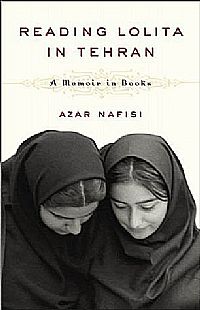
Reading Lolita in Tehran: A Memoir In Books
By Azar Nafisi
003/2004. USA/Iran. Politcal Memoir/Literary Criticism. English/Spanish
When literature professor Nafisi resigned her academic post from the University of Tehran, she decided to "indulge" herself and teach forbidden works of Western literature to seven women in her home. This book, which is part memoir, part literary criticism but transcends both genres, tells the remarkable story of the two years Nafisi and her students met secretly to continue their studies. Nafisi details the restrictions imposed on women during the fundamentalist regime - from morality guards and bodily searches to imprisonment. In the safety of Nafisi's living room, the women "shed their mandatory veils and robes and burst into color."
Reading Lolita shows how literature allowed the women to explore parallels between the works they were reading and the Ayatollah's oppressive regime and to "create little pockets of freedom."
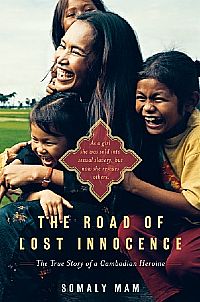
The Road of Lost Innocence: As a Girl She Was Sold Into Slavery, But Now She Rescues Others. The True Story of a Cambodian Heroine
By Somaly Mam
2008. Cambodia. Autobiography. English.
This international bestseller is an awe-inspiring tale that demonstrates how one woman saves herself and the lives of other women. Mam was born in a remote village in the Cambodian forest and sold into sexual slavery when she was just twelve. The book recounts this early life and the decade Mam spent as a slave as part of Southeast Asia's enormous sex trade industry. Though the details Mam tells about her rapes and torture are truly horrific, the prose is spare, unflinching, and beautiful.
With the help of a French aid worker, Mam manages to escape and the story then tells of Mam's growing activism and her courageous fight to rescue other sex workers - including some girls as young as five or six - who are caught in the abominable, life-stealing sex trade.
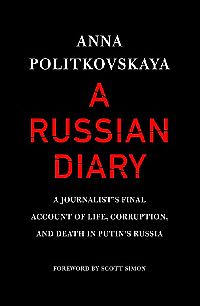
A Russian Diary: A Journalist's Final Account of Life, Corruption, and Death in Putin's Russia
By Anna Politkovskaya
2007. USA/Russia. Political Diary. English.
It's hard not to read Politkovskaya's riveting diary without a sense of sadness and foreboding, for this fearless journalist was murdered outside her Moscow apartment shortly after completing the book. The entries, written in diary form, span the years 2003-2005 and detail the growing corruption and encroaching power of the Russian government under Putin. Drawing on interviews with politicians and citizens as well as her own recollections, Politkovskaya eloquently chronicles the crumbling of democratic freedoms and civil rights under Putin, the abuses in the Chechen war, and the brutality of security forces.
From the media who she accused of being too afraid to report on corruption to the lack of adequate response to the Beslan school siege, Politkovskaya writes openly and with a sense of outrage at growing totalitarianism.
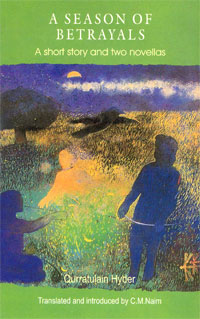
Season of Betrayals
By Qurratulain Hyder
1999. India. Short Stories. Urdu/English.
This collection of two novellas and a short story by one of the leading writers of Urdu fiction, Qurratulain Hyder, explores the lives of women who are exiled -- both externally and internally. The stories were written in the 1960s, and they focus on the time following Indian independence in 1947. Told in a fast-paced style, Hyder's stories move quickly from scene to scene which mirrors the cataclysmic reality that the women find themselves in. We meet Sita Mirchandani, a Hindu refugee who now lives in India, and two Muslim girls who are exiled to Pakistan. Hyder's protagonists are unanchored, set adrift, due to the political upheaval in their lives. They find themselves, "not quite knowing what happened to them and why" writes C.M. Nain, who translated Hyder's work from Urdu.
These stories show how women struggled to come to terms with personal, political, and historical betrayals.
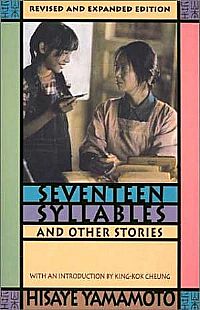
Seventeen Syllables and Other Stories Revised and Updated with Four New Stories
By Hisaye Yamamoto
001. USA/Japan. Short Stories. English.
These tender and moving stories written between 1948 and 1987 are told mostly by female protagonists and reveal glimpses into the lives of Japanese-Americans. Yamamoto covers such themes as the Japanese Internment during World War II and the experiences of Japanese-American women who are caught between two worlds: the traditional culture of their husbands and the western world their children inhabit. From dusty internment camps to the hopes and dreams of recent immigrants, Yamamoto writes beautifully about women on the margins of American society. Her stories are tender and tragic, yet filled with humor and insight. The title story, "Seventeen Syllables," details a woman's obsession with self-expression through haiku and her husband's objections to her poetry.
Hisaye Yamamoto was awarded the 1986 American Book Award for Lifetime Achievement from the Before Columbus Foundation.
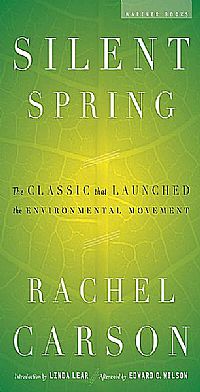
Silent Spring
By Rachel Carson
1962. USA. Political Nonfiction. English/Spanish/French
Long before Al Gore's Inconvenient Truth, Rachel Carson sounded the alarm bell about humankind's degradation of the environment. This landmark book begins with a fable: "There once was a town in America where all life seemed to live in harmony with its surroundings." But the idyll doesn't last, for Carson reveals how chemical spraying of pesticides wreaks havoc on plants, animals, humans, and especially birds who have died: their songs can no longer be heard heralding the spring. With the eye of a scientist but in clear, accessible prose, Carson explains how chemicals poison humans and the land; she proposed careful and responsible use of pesticides.
This book, a radical political act in and of itself, caused an uproar and led to regulations on the chemical industry and the banning of certain pesticides in the United States a decade later.
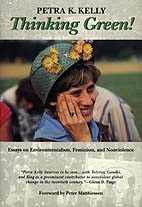
Thinking Green!: Essays on Environmentalism, Feminism, and Nonviolence
By Petra Kelly
1993. USA/Germany. Political Essays. English
This posthumous collection of speeches and writings by the co-founder of the German Green Party and Member of Parliament, who was killed in mysterious circumstances, is a moving account of Kelly's commitment to peace and feminism. The collection begins with a biographical essay about Kelly that originally appeared in Vanity Fair Magazine, and closes with tributes about the late author by women's and environmental groups. In between are Kelly's moving speeches, articles, and interviews on such ideas as women and power, the arms race, the environment, nonviolence and feminism. Kelly writes that there is a, "clear and profound relationship between militarism, environmental degradation and sexism."
This collection shows Kelly's passionate fight for environmental safety and peace and sends an inspiring message to activists to continue fighting for environmental safety and peace.
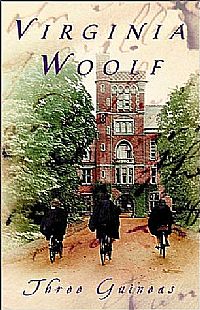
Three Guineas
By Virginia Woolf
1938. England. Political Essay. English/French/Spanish
In this book-length essay, Virginia Woolf answers three separate requests for a guinea, (about one pound and one shilling in British money)one from a woman's college building fund, another for a society promoting the employment of professional women, and one from a letter-writer asking, "How in [her] opinion are we to prevent war?" Woolf's thoughtful response is structured as a series of letters in which she muses about why these requests for money exist. "Why are women not allowed to engage in professional work?" Woolf asks. "Why does the government not support education for women?" The topics are deep, but Woolf's style is conversational and dialogic as we see her mind wrestling with these problems.
Though it was written on the eve of World War II, Woolf's thoughts on the causes of war still ring fresh and true - and are instructive in this contemporary era.
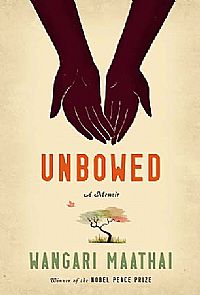
Unbowed: A Memoir
By Wangari Maathai
2006/2007/2007. USA/Kenya. Political Memoir. English/Spanish/French
This inspiring memoir by 2004 Nobel Peace Prize recipient Wangari Maathai begins with the author's edenic childhood in the 1940s, a time when Kenya was a "lush, green, fertile," land. But Maathai shows how corrupt governmental practices led to deforestation and environmental degradation. In clear-eyed and conversational prose, Maathai recounts her early feminism - she was determined to get an education, though few girls in Kenya were educated - and then details her growing political activism and environmentalism. In 1977, Maathai established the Green Belt Movement that mobilized thousands of under-employed women to plant trees.
Maathai was called a "wayward" woman by President Moi, with whom she had many run-ins. She was beaten, imprisoned, and received death threats, but her memoir shows her resilience and hope, as she focuses, "on what can be done."
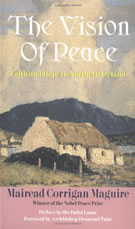
The Vision of Peace: Faith and Hope in Northern Ireland
By Mairead Corrigan Maguire
1999. Ireland. Political Essays. English.
This collection of essays and letters by Nobel Peace Prize laureate Mairead Macquire is a moving testament of the author's commitment to nonviolence and peace. In 1976, Mairead Maguire lost new nephews and one niece who were killed when a car driven by an IRA gunman ran them over. Maguire turned to her faith and began organizing peace demonstrations that mobilized more than half a million people in Britain. These clearly written essays mostly focus on the political situation in Northern Ireland, but Maguire also turns her eye to political unrest in India, East Timor, and Yugoslavia.
In graceful prose, Maguire writes that, "hope for the future depends on each of us taking non-violence into our hearts and minds and developing new and imaginative structures which are non-violent and life-giving for all.... Some people will argue that this is too idealistic. I believe it is very realistic.... We can rejoice and celebrate today because we are living in a miraculous time. Everything is changing and everything is possible."
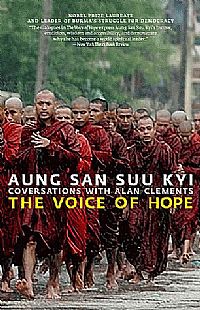
The Voice of Hope
By Aung San Suu Kyi with Alan Clements
1998. USA/Burma. Political Autobiography. English
This book recounts 9 months' of conversation between Burmese pro-democracy and human rights leader Aung San Suu Kyi and Burmese expert and former Buddhist monk, Alan Clements. Though Aung San Suu Kyi was under house arrest, imprisoned by the ruling junta, her conversations are hopeful and optimistic, as she continues to meditate and work for peace. Like the Dalai Lama, Aung San Suu Kyi advocates nonviolence, and she and Clements discuss compassion, truth, freedom and Buddhism. With chapters entitled such as "It still surprises me that people think of me as an important person," the book reads as if you're talking to Aung San directly.
Aung San Suu Kyi was awarded the Nobel Peace Prize, and the book is a revealing portrait of the author whose love for her country, despite its oppressive government, and for all people shines through.
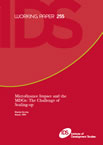
Why the Development Industry Should Get Over its Obsession with Bad Sex and Start to Think About Pleasure
By Susie Jolly
2007. Working Paper. English
In this fascinating position paper, Susie Jolly takes the opposite view that sex and sexuality are inherently dangerous and asserts that pleasure and danger are more ambiguously mixed. Jolly's work is a corrective vision to the binary way of thinking that has, for the most part, framed the discussion of sex and sexuality. Jolly asserts that promoting sexuality can lead to empowerment for many people, not only women but also sexual minorities and those living with HIV/AIDS. This kind of thinking, she argues, can actually stem the spread of the disease. Jolly also notes that stereotyping - positioning women as victims and men as predators -- leaves out transgender people.
Jolly's work is a fresh perspective and necessary critique of the development industry's view that sex and sexuality can lead to violence, disease, and out-of-control population growth.
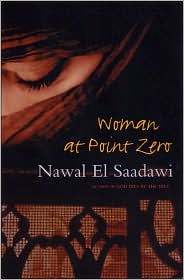
Woman at Point Zero
By Nawal El Saadawi
1991. USA. Egypt. Political Novel. English.
This page-turner by Egyptian feminist writer Nawal El Saadawi is a short, haunting novel about a woman who is executed for murder. The novel is told in the first person by Firdaus, who grew up poor and suffered abuse first from her parents and then from various men. Firdaus uses her body to escape from poverty, turning to prostitution. Later she is accused of murdering a pimp. El Saadawi had visited a woman's prison in 1973 and interviewed a woman named Firdaus on the eve of her execution, which became the impetus for the novel.
Told in spare but gripping prose with stark imagery, Woman at Point Zero is a sad, yet strangely powerful tale, and while it focuses on a particular Egyptian woman, its message of women's oppression and revolt is universal.
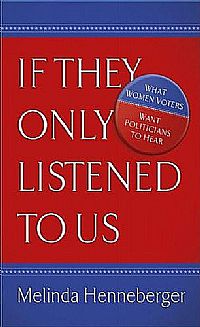
If They Only Listened to Us: What Women Voters Want Politicians to Hear
By Melinda Henneberger
2007. USA. Political Non-Fiction. English
What do women want? In 2004, journalist Melinda Henneberger set out across the United States to see if she could find out. After interviewing 234 ordinary American women, she discovered that -- not only is no one listening -- no one is asking questions to begin with.
Over eighteen months, Henneberger spoke in depth and at length with women about the important concerns of the day, including the war, economics, sex, and religion. She repeatedly heard that neither party takes any genuine interest in their actual lives, and that politicians across the board seem, as a young waitress in Sacramento put it, "to be talking about people who don't exist."
Henneberger shines a light on what women voters are thinking and how that translates into how and for whom they vote. Her findings will surprise you.
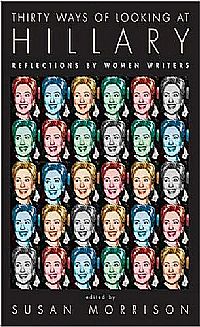
Thirty Ways of Looking at Hillary: Reflections by Women Writers
By Edited by Susan Morrison
2008. Political Essays. English
Poet Wallace Stevens famously listed "Thirteen Ways of Looking at a Blackbird." Journalist Susan Morrison turned her eye to presidential candidate, senator and former First Lady Hillary Rodham Clinton. Morrison asked 30 female writers to contribute their views on the woman who's called herself "a Rorschach test for voters."
No other US politician inspires such a wide range of passionate feelings as Hillary Clinton. The essays focus on details from the personal to the political, from the hard-hitting to the whimsical, to give a well-balanced and unbiased view. Clinton has become the repository of many women's contradictory hopes and fears. Cold or competent, overachiever or pioneer, too radical or too moderate, she continues to overturn the assumptions we make about her.

